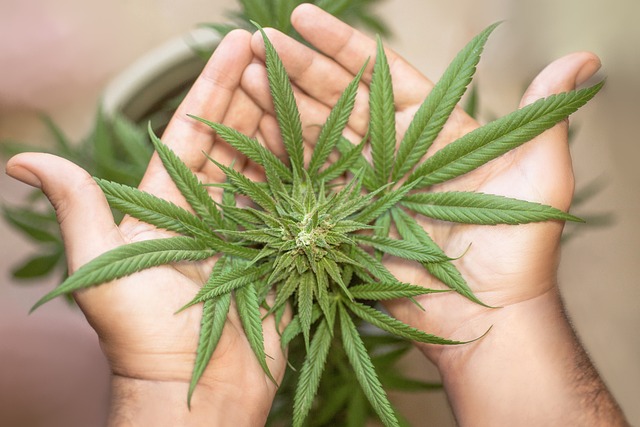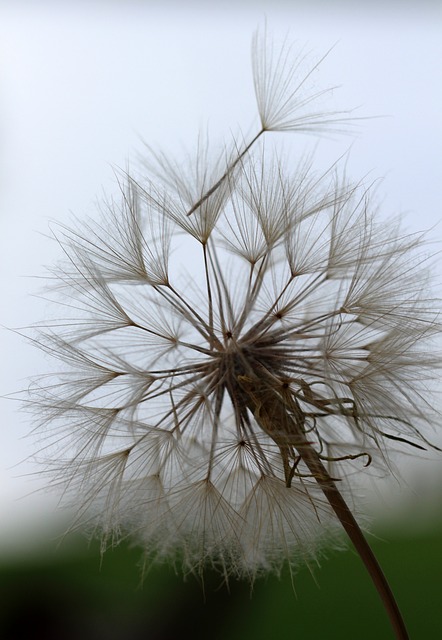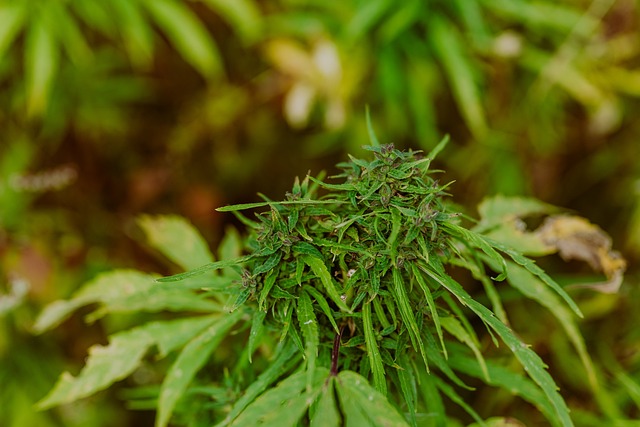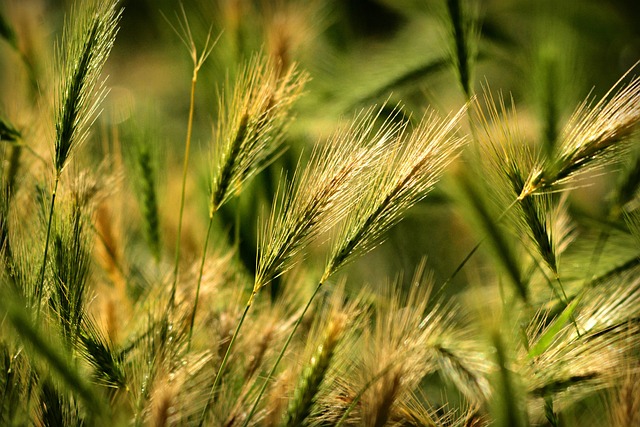2023 has seen a significant shift in the perception and legal status of THCA, a non-psychoactive cannabinoid found in hemp with potential therapeutic benefits, particularly in Kansas. Here, THCA-rich hemp flowers are legally recognized under specific conditions, reflecting a growing interest in its anti-inflammatory, neuroprotective, and potential anti-cancer properties. Unlike its psychoactive counterpart THC, THCA does not induce mind-altering effects, making it an appealing choice for those seeking the health advantages of cannabinoids without psychoactive side effects. In Kansas, THCA products with less than 0.3% delta-9-THC are legal under state law and federal guidelines from the 2018 Farm Bill, offering a clear legal pathway for exploring its potential health benefits. As research continues to uncover more about THCA's mechanisms of action, it remains a focus of scientific interest for its therapeutic possibilities, with Kansas being a leading example of its current legal status in the United States.
Exploring the therapeutic and wellness applications of cannabinoids, this article delves into the burgeoning interest surrounding THCA (Tetrahydrocannabinolic Acid), particularly within the context of its legality and benefits in Kansas. We will dissect the various forms of cannabinoids, emphasizing THCA’s unique position and its potential health advantages supported by scientific research. From its anti-inflammatory and neuroprotective properties to its role in gastrointestinal health, we’ll examine the evidence backing these benefits. Additionally, we’ll navigate the intricacies of safely consuming THCA flower, considering dosage and safety aspects specific to Kansas’ legal landscape. This comprehensive guide also includes expert insights, tips on storage, and practical advice for incorporating THCA into your wellness routine, ensuring you are informed and equipped with knowledge about this natural compound.
- Unveiling the Potential of THCA Flower: An Overview
- The Legal Landscape of THCA in Kansas
- What is THCA and Its Natural Occurrence in Cannabis
- THCA Flower vs. Other Cannabinoid Forms: A Comparative Analysis
- The Benefits of THCA: A Deep Dive into Scientific Evidence
- Anti-Inflammatory Properties: How THCA Flower May Offer Relief
Unveiling the Potential of THCA Flower: An Overview

2023 has marked a significant shift in the legal landscape for cannabis-related compounds, with THCA (Tetrahydrocannabinolic Acid) gaining attention as a potential powerhouse of wellness benefits. In states like Kansas, where THCA-rich hemp flowers are recognized as legal under certain conditions, enthusiasts and researchers alike are exploring the untapped potential of this non-psychoactive cannabinoid. THCA is the precursor to THC, the psychoactive component of cannabis, and has shown promise in various health applications without the psychotropic effects. Its legal status in Kansas opens avenues for consumers to experience its purported benefits, which include anti-inflammatory, neuroprotective, and potential anti-cancer properties. As research continues to unfold, the interest in THCA flower as a natural remedy or supplement is growing, with many users reporting positive effects on pain management, stress relief, and overall health improvement. The nuanced legal distinction between THC and THCA has paved the way for a new frontier in cannabinoid wellness, one that promises to be both enlightening and beneficial. With the thca legal in Kansas, users have access to products that can offer a range of benefits without the high associated with its psychoactive cousin, THC. This presents an exciting opportunity for those interested in the therapeutic potential of cannabinoids to explore this emerging market responsibly and legally within the state’s guidelines.
The Legal Landscape of THCA in Kansas

As of my knowledge cutoff date in early 2023, the legal landscape of THCA, or tetrahydrocannabinolic acid, a non-psychoactive cannabinoid found in raw cannabis that can convert into THC when heated, in Kansas is subject to ongoing legislative developments. In recent years, Kansas has seen a gradual shift towards more favorable policies regarding cannabis and its derivatives. The state legalized hemp and hemp-derived products, including CBD, in 2018, following the federal Farm Bill’s passage. However, it’s important to note that while hemp-derived THCA products may be legally available, any product derived from marijuana, which is still considered a controlled substance under Kansas law, remains illegal except for patients enrolled in the state’s limited medical cannabis program.
The nuances of THCA legality in Kansas stem from distinctions between hemp and marijuana, with the former now allowed to contain trace amounts of THC, including THCA, providing it is sold as a supplement or consumed as a food item. The Kansas Department of Agriculture oversees hemp cultivation and processing, ensuring compliance with state and federal regulations. Consumers interested in THCA products should be aware that the market for these items is evolving, and while there is a growing selection of hemp-derived THCA products available, it’s crucial to stay informed about the latest legal changes. Retailers and consumers alike must navigate this dynamic environment carefully to ensure adherence to the law.
What is THCA and Its Natural Occurrence in Cannabis

Tetrahydrocannabinolic acid A (THCA) is a naturally-occurring cannabinoid found in the Cannabis sativa plant. It’s one of the many active compounds present in both hemp and marijuana varieties, from which THC (tetrahydrocannabinol), its decarboxylated form, is derived. THCA exists naturally in raw cannabis flowers and predominates until the plant is heated or cured, at which point it can convert into THC or CBD (cannabidiol). This cannabinoid is non-psychoactive, meaning it does not induce the ‘high’ typically associated with its psychoactive counterpart, THC.
Interestingly, THCA is gaining attention for its potential therapeutic properties, which include anti-inflammatory, anti-nausea, anti-proliferative, and neuroprotective effects. These benefits are currently being explored in various studies, providing a scientific basis for the interest in this cannabinoid. As of the knowledge cutoff in 2023, THCA’s legal status varies by jurisdiction. In Kansas, THCA is legal, provided it contains less than 0.3% delta-9-THC on a dry weight basis, as per the 2018 Farm Bill and Kansas state laws. This distinction allows consumers in Kansas to access products containing THCA for its wellness benefits without engaging in activities associated with recreational or medicinal marijuana use, which are governed by different regulations. As such, THCA’s presence in hemp-derived products has opened up a new avenue for exploring the full spectrum of cannabinoids and their potential health benefits within the legal framework set forth by state and federal laws.
THCA Flower vs. Other Cannabinoid Forms: A Comparative Analysis

THCA, or Tetrahydrocannabinolic Acid, is a non-psychoactive cannabinoid found in raw cannabis plants, which, when heated, converts into the well-known psychoactive substance THC. The benefits of THCA flower, particularly in the context of health and wellness, are attracting increasing attention. Unlike its decarboxylated counterpart, THC, THCA is not intoxicating, making it a legal option for consumers in regions where cannabis legislation allows for such distinctions. In states like Kansas, where the legal landscape regarding cannabinoids can be nuanced, THCA flower stands out as a viable alternative for those seeking the potential therapeutic effects associated with cannabis without the psychoactive impact.
When comparing THCA flower to other cannabinoid forms, it’s important to consider the unique properties of THCA itself. Preliminary research suggests that THCA may offer anti-inflammatory and neuroprotective benefits, which could be beneficial for conditions like arthritis or neurodegenerative diseases. Additionally, because THCA is non-psychoactive, it can be consumed throughout the day without impairment, making it a versatile option for therapeutic use. Furthermore, THCA’s legal status in certain jurisdictions, such as Kansas, where it falls within the regulatory gray area until specifically outlawed, provides consumers with a legally accessible cannabinoid that aligns with local laws. This contrasts with other cannabinoids like CBD and CBN, which are also non-psychoactive but may be subject to different regulations depending on THC content and how they are marketed. Thus, for individuals looking for the potential benefits of cannabinoids within the scope of legal compliance, THCA flower presents a compelling option.
The Benefits of THCA: A Deep Dive into Scientific Evidence

delta-9-tetrahydrocannabinolic acid (THCA) is a non-psychoactive cannabinoid found in the Cannabis sativa plant, which has garnered attention for its potential therapeutic properties. As of my knowledge cutoff in 2023, THCA is legal in Kansas under state law, provided it contains less than 0.3% delta-9-THC on a dry weight basis, aligning with the 2018 Farm Bill federal regulations. In recent scientific studies, THCA has been shown to exhibit a range of health benefits, some of which are supported by preclinical evidence. For instance, THCA may have neuroprotective effects due to its ability to interact with the endocannabinoid system, potentially benefiting conditions like inflammatory bowel disease and neurodegenerative diseases. Additionally, research suggests that THCA could inhibit the growth of certain types of cancer cells in vitro, indicating its possible role as an anti-cancer agent. These findings underscore the importance of further research to elucidate the mechanisms by which THCA exerts its effects and to explore its full potential therapeutically. As legal frameworks continue to evolve, understanding the scientific basis for the benefits of THCA becomes increasingly pertinent for those interested in its potential applications, especially within states like Kansas where it is currently permitted.
Anti-Inflammatory Properties: How THCA Flower May Offer Relief

delta-9-tetrahydrocannabinolic acid (THCA) is the raw, non-psychoactive form of THC found in cannabis flowers. While THCA itself does not produce psychoactive effects, it exhibits a range of potential therapeutic properties, among which are its anti-inflammatory benefits. Research suggests that THCA interacts with the body’s endocannabinoid system through its affinity for certain cannabinoid receptors, particularly CB2, without activating them in the same way as its psychoactive counterpart, THC. This interaction may help modulate inflammatory responses within the body, making it a subject of interest for those seeking natural ways to manage pain and inflammation.
In states where cannabis has been legalized, including THCA-rich products like flowers, individuals are exploring its potential health benefits. In Kansas, for instance, the legal status of THCA flower is undergoing clarification, with some products containing less than 0.3% delta-9-THC being considered legal under state and federal laws. This legal distinction allows consumers to experiment with THCA’s anti-inflammatory properties without the psychoactive impact associated with higher levels of THC. Users report finding relief from various inflammatory conditions, including those related to arthritis and muscle soreness, making THCA flower a promising alternative for natural pain management. As research continues, it is becoming increasingly clear that THCA’s potential benefits extend beyond its psychoactive cousin, offering a compelling option for those in search of effective anti-inflammatory relief.
The exploration of THCA flower benefits has shed light on its promising potential, particularly within the context of natural wellness. As discussed, THCA’s anti-inflammatory properties and other therapeutic effects are rooted in scientific evidence that warrants further investigation. With the legal landscape of THCA in Kansas evolving, users have access to this non-intoxicating form of cannabis with increasing ease. Compared to other cannabinoid forms, THCA flower offers distinct advantages for those seeking relief and wellness support without psychoactive effects. The findings underscore the importance of considering THCA as a natural alternative in health and wellness routines, especially within states like Kansas where its legal status is becoming more favorable. As research continues to accumulate, the benefits of incorporating THCA flower into one’s regimen may become more widely recognized.
